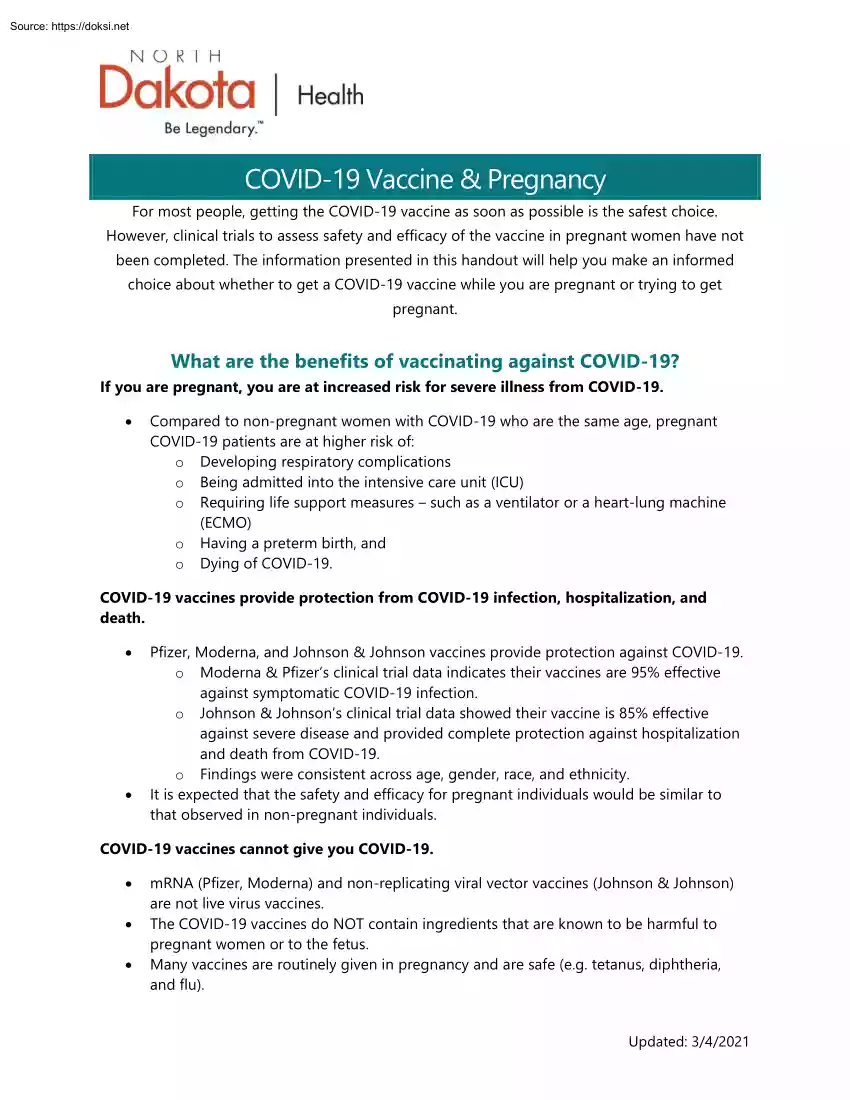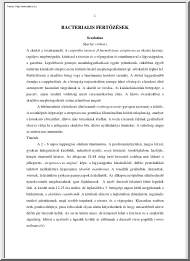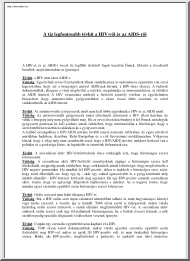Datasheet
Year, pagecount:2021, 3 page(s)
Language:English
Downloads:3
Uploaded:May 20, 2021
Size:734 KB
Institution:
-
Comments:
Attachment:-
Download in PDF:Please log in!
Comments
No comments yet. You can be the first!
Most popular documents in this category
Content extract
COVID-19 Vaccine & Pregnancy For most people, getting the COVID-19 vaccine as soon as possible is the safest choice. However, clinical trials to assess safety and efficacy of the vaccine in pregnant women have not been completed. The information presented in this handout will help you make an informed choice about whether to get a COVID-19 vaccine while you are pregnant or trying to get pregnant. What are the benefits of vaccinating against COVID-19? If you are pregnant, you are at increased risk for severe illness from COVID-19. • Compared to non-pregnant women with COVID-19 who are the same age, pregnant COVID-19 patients are at higher risk of: o Developing respiratory complications o Being admitted into the intensive care unit (ICU) o Requiring life support measures – such as a ventilator or a heart-lung machine (ECMO) o Having a preterm birth, and o Dying of COVID-19. COVID-19 vaccines provide protection from COVID-19 infection, hospitalization, and death. • •
Pfizer, Moderna, and Johnson & Johnson vaccines provide protection against COVID-19. o Moderna & Pfizer’s clinical trial data indicates their vaccines are 95% effective against symptomatic COVID-19 infection. o Johnson & Johnson’s clinical trial data showed their vaccine is 85% effective against severe disease and provided complete protection against hospitalization and death from COVID-19. o Findings were consistent across age, gender, race, and ethnicity. It is expected that the safety and efficacy for pregnant individuals would be similar to that observed in non-pregnant individuals. COVID-19 vaccines cannot give you COVID-19. • • • mRNA (Pfizer, Moderna) and non-replicating viral vector vaccines (Johnson & Johnson) are not live virus vaccines. The COVID-19 vaccines do NOT contain ingredients that are known to be harmful to pregnant women or to the fetus. Many vaccines are routinely given in pregnancy and are safe (e.g tetanus, diphtheria, and flu).
Updated: 3/4/2021 • These vaccines do not alter human DNA. Therefore, mRNA and non-replicating viral vector vaccines cannot cause any genetic changes to an unborn baby. What are the risks of vaccinating against COVID-19? COVID-19 vaccines have not yet been tested in pregnant women. • • • • The Moderna, Pfizer, and Johnson & Johnson vaccines were tested in 30,00 to 44,000 people in clinical trials, and there were no serious side effects. However, these vaccines were not specifically tested in pregnant women. Some women did become pregnant during the study. No adverse events in the vaccinated pregnant women have been reported from clinical trials. Over 30,000 pregnant women have been vaccinated against COVID-19 in the U.S and no safety concerns have been identified via the vaccine safety monitoring systems. o FDA and CDC are continuing to monitor the safety of COVID-19 vaccines in pregnant women. As of February 18, 2021, Pfizer has begun to enroll pregnant women
in a clinical trial to evaluate the safety and efficacy of their COVID-19 vaccine in this group and whether infants receive any protective antibodies from their mother. Additionally, developmental and reproductive toxicity (DART) studies, which use animal models, were conducted to ensure safety of vaccines prior to use in pregnant women. Results from DART studies: o Pfizer - studies completed in Europe have shown no safety signals o Moderna - found no safety concerns o Johnson & Johnson – found no safety concerns People getting the vaccine could experience some side effects. • • • • There were no serious side effects reported in the clinical studies, yet many people have some side effects from the Moderna, Pfizer, and Johnson & Johnson COVID-19 vaccine. Common side effects reported include injection site pain, fatigue, headache, muscle pain, joint pain, and fever. o Pregnant women who experience a fever should take Tylenol (acetaminophen). Side effects are more
common after the second dose for two-dose series (Pfizer, Moderna). Side effects are a sign your immune system is working. How to make an informed decision. 1. Make sure you understand as much as you can about COVID-19 and about the vaccines 2. Have a conversation with a trusted healthcare professional, such as your doctor or midwife, about getting vaccinated. Updated: 3/4/2021 3. Consider your own risk of getting COVID-19 ✓ ✓ ✓ ✓ ✓ ✓ ✓ You are at increased risked if: You have contact with people outside your household who don’t wear masks You are 35 years or older You are overweight You have other medical problems such as diabetes, high blood pressure, or heart disease You are a smoker Your community has a high rate of COVID-19 infection You are a healthcare worker You are at lower risk if: ✓ You are always able to wear a mask ✓ You and those you live with can socially distance from others for your whole pregnancy ✓ Your community does not have high or
increasing rates of COVID-19 being reported What do the experts recommend? The American College of Obstetricians & Gynecologists (ACOG) recommends: “COVID-19 vaccines should not be withheld from pregnant individuals who meet criteria for vaccination based on ACIP-recommended priority groups.” The Society for Maternal-Fetal Medicine strongly recommends that pregnant individuals have access to COVID-19 vaccines. They recommend that each person have discussion with their healthcare professional about their own personal choice. Updated: 3/4/2021
Pfizer, Moderna, and Johnson & Johnson vaccines provide protection against COVID-19. o Moderna & Pfizer’s clinical trial data indicates their vaccines are 95% effective against symptomatic COVID-19 infection. o Johnson & Johnson’s clinical trial data showed their vaccine is 85% effective against severe disease and provided complete protection against hospitalization and death from COVID-19. o Findings were consistent across age, gender, race, and ethnicity. It is expected that the safety and efficacy for pregnant individuals would be similar to that observed in non-pregnant individuals. COVID-19 vaccines cannot give you COVID-19. • • • mRNA (Pfizer, Moderna) and non-replicating viral vector vaccines (Johnson & Johnson) are not live virus vaccines. The COVID-19 vaccines do NOT contain ingredients that are known to be harmful to pregnant women or to the fetus. Many vaccines are routinely given in pregnancy and are safe (e.g tetanus, diphtheria, and flu).
Updated: 3/4/2021 • These vaccines do not alter human DNA. Therefore, mRNA and non-replicating viral vector vaccines cannot cause any genetic changes to an unborn baby. What are the risks of vaccinating against COVID-19? COVID-19 vaccines have not yet been tested in pregnant women. • • • • The Moderna, Pfizer, and Johnson & Johnson vaccines were tested in 30,00 to 44,000 people in clinical trials, and there were no serious side effects. However, these vaccines were not specifically tested in pregnant women. Some women did become pregnant during the study. No adverse events in the vaccinated pregnant women have been reported from clinical trials. Over 30,000 pregnant women have been vaccinated against COVID-19 in the U.S and no safety concerns have been identified via the vaccine safety monitoring systems. o FDA and CDC are continuing to monitor the safety of COVID-19 vaccines in pregnant women. As of February 18, 2021, Pfizer has begun to enroll pregnant women
in a clinical trial to evaluate the safety and efficacy of their COVID-19 vaccine in this group and whether infants receive any protective antibodies from their mother. Additionally, developmental and reproductive toxicity (DART) studies, which use animal models, were conducted to ensure safety of vaccines prior to use in pregnant women. Results from DART studies: o Pfizer - studies completed in Europe have shown no safety signals o Moderna - found no safety concerns o Johnson & Johnson – found no safety concerns People getting the vaccine could experience some side effects. • • • • There were no serious side effects reported in the clinical studies, yet many people have some side effects from the Moderna, Pfizer, and Johnson & Johnson COVID-19 vaccine. Common side effects reported include injection site pain, fatigue, headache, muscle pain, joint pain, and fever. o Pregnant women who experience a fever should take Tylenol (acetaminophen). Side effects are more
common after the second dose for two-dose series (Pfizer, Moderna). Side effects are a sign your immune system is working. How to make an informed decision. 1. Make sure you understand as much as you can about COVID-19 and about the vaccines 2. Have a conversation with a trusted healthcare professional, such as your doctor or midwife, about getting vaccinated. Updated: 3/4/2021 3. Consider your own risk of getting COVID-19 ✓ ✓ ✓ ✓ ✓ ✓ ✓ You are at increased risked if: You have contact with people outside your household who don’t wear masks You are 35 years or older You are overweight You have other medical problems such as diabetes, high blood pressure, or heart disease You are a smoker Your community has a high rate of COVID-19 infection You are a healthcare worker You are at lower risk if: ✓ You are always able to wear a mask ✓ You and those you live with can socially distance from others for your whole pregnancy ✓ Your community does not have high or
increasing rates of COVID-19 being reported What do the experts recommend? The American College of Obstetricians & Gynecologists (ACOG) recommends: “COVID-19 vaccines should not be withheld from pregnant individuals who meet criteria for vaccination based on ACIP-recommended priority groups.” The Society for Maternal-Fetal Medicine strongly recommends that pregnant individuals have access to COVID-19 vaccines. They recommend that each person have discussion with their healthcare professional about their own personal choice. Updated: 3/4/2021





 When reading, most of us just let a story wash over us, getting lost in the world of the book rather than paying attention to the individual elements of the plot or writing. However, in English class, our teachers ask us to look at the mechanics of the writing.
When reading, most of us just let a story wash over us, getting lost in the world of the book rather than paying attention to the individual elements of the plot or writing. However, in English class, our teachers ask us to look at the mechanics of the writing.